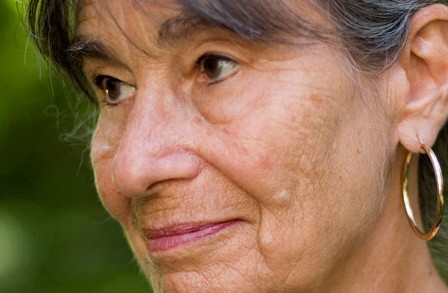 by Daniela Gioseffi
by Daniela Gioseffi
We sit at Alicia Suskin Ostriker’s dining table, with China teacups before us, in her tastefully arrayed New York City apartment. There are paintings, perhaps some of her own, on the walls. In addition to being an acclaimed poet and scholar, she’s also a visual artist who has written about painters from Rembrandt to Matisse. Ostriker’s ability to convey emotional depth and psychological wisdom in a poetry of profound intelligence, humor, earthiness, and honesty, is undiminished in her older years—and inspiring to Daniela Gioseffi, now also in her senior years with several published books behind me. Gioseffi marvels at Ostriker’s originality, and identifies with her content.
Ostriker was born in Brooklyn and lived in Brooklyn and Manhattan until the age of eighteen. Her mother, Beatrice Suskin, was an English major who wrote poetry and read Shakespeare, Tennyson, and Browning to her daughter, nurturing her love of the art. Ostriker went on to earn a Ph.D. from the University of Wisconsin, Madison. In 1965, her doctoral dissertation became her first published book, Vision and Verse in William Blake (University of Wisconsin Press). Later, she edited and annotated William Blake's The Complete Poems for Penguin Classics.
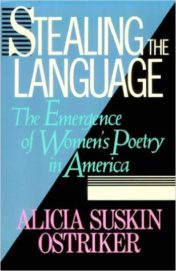 A teacher of literature and creative writing for many years at Rutgers University, Ostriker is much loved by her many students for her knowledgeable and clear style of teaching, and her accessible but highly imaginative poetry. She’s published over fifteen books of poetry and several scholarly works, including Stealing the Language: The Emergence of Women’s Poetry in America (Beacon Press, 1986) and Dancing at the Devil’s Party: Essays on Poetry, Politics and the Erotic (University of Michigan Press, 2000). She’s won several prestigious awards for her work, among them the William Carlos Williams Award from The Poetry Society of America, the San Francisco State Poetry Center Award, and the National Jewish Book Award; she’s twice been a finalist for the National Book Award.
A teacher of literature and creative writing for many years at Rutgers University, Ostriker is much loved by her many students for her knowledgeable and clear style of teaching, and her accessible but highly imaginative poetry. She’s published over fifteen books of poetry and several scholarly works, including Stealing the Language: The Emergence of Women’s Poetry in America (Beacon Press, 1986) and Dancing at the Devil’s Party: Essays on Poetry, Politics and the Erotic (University of Michigan Press, 2000). She’s won several prestigious awards for her work, among them the William Carlos Williams Award from The Poetry Society of America, the San Francisco State Poetry Center Award, and the National Jewish Book Award; she’s twice been a finalist for the National Book Award.
As we meet Ostriker she has just finished leading a discussion on Midrash that doubles as a poetry workshop based on reading The Old Testament, a subject about which she is highly knowledgeable. She’s written volumes on the subject: Feminist Revision and the Bible (Wiley-Blackwell, 1993), For the Love of God: The Bible as an Open Book (Rutgers University Press, 2007), and The Nakedness of the Fathers: Biblical Visions and Revisions (Rutgers University Press, 1997), a controversial combination of midrash and autobiography from the perspective of a twentieth-century Jewish woman.
She has recently moved back to Manhattan with her husband, Jeremiah Ostriker, a noted astrophysicist who taught at Princeton University for many years. Her latest books of poetry, The Book of Seventy (2009) and The Old Woman, The Tulip and the Dog (2014), both from University of Pittsburgh Press, are impressive.
Daniela Gioseffi: It’s a privilege for me to have this conversation with you. You give me great hope that I have productive years ahead, because you keep writing in your older years with as much verve and skill as ever.
I know you’ve espoused the idea that the personal is political when it comes to women’s poetry. I think of you as a poet-priestess of the second wave of feminism from the time you wrote Stealing the Language and I was pleased to have a poem of mine quoted in that encompassing book, in which you wrote about so many women poets of the time emerging from repression and blossoming forth with strong and erotic writing. I think the phenomenon of what you called then “women’s poetry” has merged now into the mainstream of poetry, as it’s not so concerned with the search for a female voice. Would you elaborate on these thoughts?
Alicia Suskin Ostriker: During the second wave of feminism, from the 1960s through the ’70s, the most important poetry being written in America was by women. Some of it was published by newly-founded women’s presses, some by other small literary journals, some even by mainstream presses. You can think of Plath, Sexton, and Adrienne Rich, for example. But in fact, hundreds of women were writing revolutionary work at this time. The position of having one foot inside and one foot outside mainstream culture, any culture, is maximally productive of creativity, and that’s where women were in post ’60s America. Earlier in the century the strongest writing in America was by Jews. Jews were becoming assimilated into American culture, but were still not quite assimilated, which is why you have that generation of Bellow, Roth, Malamud and many others. One foot in and one foot out of mainstream culture— it’s not a comfortable position. But the discomfort is a driver of creativity. Now, I feel, the most exciting poetry is being written by people of color. For this I thank Cave Canem, an organization that’s created a community outside of academe in which young black poets can read each other, teach each other, and have older black poets supporting them. Their work goes from hip hop to very formal traditional poetry, and everything in between. One foot in and one foot out of the dominant culture. College degrees, sure, and still facing racism everywhere—out of that contradiction comes torrents of magnificent poetry.
DG: You have seemed to feel that the personal is also, in its way, political when it comes to interpretation of The Torah. I recently read an article by Rabbi Jill Hammer adapted from a book by Hammer and Taya Shere titled The Hebrew Priestess: Ancient and New Visions of Jewish Women’s Spiritual Leadership. Do you know this book, and can you say how it relates to your own thought?
AO: Jill Hammer was in the first Midrash workshop I ever gave, part of the Institute for Contemporary Midrash in the ’90s. She was brilliant, and we became friends. Jill and her collaborator, Taya Shere, in The Hebrew Priestess, tell the story of an organization they founded which trains women to be what they are calling Jewish priestesses. The training takes place in summer institutes, and is based on traditional Jewish learning. Jill has a deep knowledge of Jewish tradition. She’s a scrupulous and thorough researcher, and she’s able to unearth all kinds of traditions in which Jewish women, in their communities, in the ancient world and in the medieval world, through the Renaissance and Early Modern Europe, had positions of power and influence of various religious kinds. It’s a very important book and one of many steps being taken to bring the Goddess, who’s the female half of the God in Jewish mysticism, and in many other traditions, back into the world. My own set of metaphors for this is that the being known as God the Father swallowed God the Mother in pre-history. In prehistoric times, there were Goddess figures for thousands of years before there were any male Gods.
DG: Cycladic figures, the Venus of Willendorf, eventually Shekhina, many others?
AO: Many others. Historically, male divinities were first the infants of the Goddesses, then their consorts over about a period of about a thousand years, and ultimately we get monotheism, which means a male God saying “there are no other Gods but Me.” When the infant gods became consorts of the goddesses, they acquired the attributes of God the Mother, making law, making war, child bearing, and so forth. Calling this phenomenon “God the Father swallowing God the Mother” should make you think of the story of Red Riding Hood, where the wolf swallows the grandmother—this must be an extremely ancient story that encodes the deity-swallowing. As the grandmother remains alive in the belly of the beast, I believe that the Goddess remains alive inside God the Father, and the being that we call God is not dying or dead, but wants to be delivered of his repressed female self. Feminists, male and female, can both be part of that process of midwifery, assisting the rebirth of the Goddess, who is half of anything that deserves to be called Divinity.
DG: Thank you. Can you also say something about the flowering of women’s poetry and its merging into the mainstream culture after the era that influenced your publishing Stealing the Language?
AO: The phenomenon of what we call “women’s poetry” has merged into the mainstream of poetry partly, yes, but not so that it’s equal. Everyone—every feminist—should check out VIDA. VIDA is an organization that supports women’s writing and keeps a count of what literary journals are publishing: What proportion of writers for journals, major reviews, minor reviews, are women? They do a count and they publicize it. A few years ago, there was a big stir when VIDA noticed that every one of what Publisher’s Weekly was calling “the ten best books of the year” were written by men. Some journals are taking the hint that it would be a good idea for them to become more diverse.
DG: Yes, especially since women are the biggest readers in many genres.
AO: That’s true, and about five or more years ago, most journals didn’t have more than one third representation of women’s writings. Some did have more. Happily, my publisher, University of Pittsburgh Press, publishes about 50/50 books by men and women. But that’s not true everywhere. So, it’s more taken for granted that women are poets and writers now, but it’s still not an equal playing field. Women are still under-represented and discouraged by many of their mentors, and sometimes are taken advantage of sexually or allow themselves to be, because they think relationships with important men will give them status and success. Big mistake.
DG: And many women are raising children on their own and getting less pay, an average of 79 cents on the dollar, as we all know. I may be wrong, but I don’t see much of all that we fought for and talked about in the second wave of feminism—the rebirth of the Goddess, the revitalization of the anima, the discovery of When God Was a Woman by Merlin Stone or Woman’s Mysteries: Ancient and Modern by M. Esther Harding or Adrienne Rich’s Of Women Born—in the writings of younger women. Do you?
AO: I’d not call myself an authority on what younger women are writing nowadays, but I don’t see much of our kind of feminist consciousness either. They’ve moved on—or so they think, even though the job is far from finished.
DG: I’ve read that 50% of American women are not married now, and they make a large voting block—and I imagine a large writing block. So what’s happened, it seems, is that there’s solipsistic poetry being written far and wide, or there’s Instagram poetry, short poems with visual images about love or unrequited love, that sells millions of books when collected into volumes—many more copies, in some cases, than Pulitzer Prize winning poets, according to an article in The New York Times this year! It’s kind of discouraging to see that everything we did to free women writers, in what was the Second Wave of Feminism, doesn’t seem to be of concern among younger generations.
AO: I can’t speak to this, I’m a dinosaur. I’ve never looked at an Instagram. You’re much more plugged in than I am, I don’t have a Facebook page or Twitter account. But, I do think that much of what we fought for during the second wave of feminism was accomplished—not all, but a good deal of what we struggled for seems to have been accomplished, and the fight for justice is now in the hands of writers of color.
DG: Yes, and also in the hands of Asian, Latina, Filipina, Native American poets. Italian American women poets had a belated blossoming, for another example, over three decades. We called ourselves “Women of the Shadows,” because we were published less than Jewish, Black, or Latina women poets. We bore that paradox you speak about of having one foot in and one foot out of the mainstream. Plus, we suffered that nasty stereotype perpetuated by Hollywood and television, when the actual FBI statistics put organized crime among Italian Americans at 0.0025%. There’s never been more crime among Italian Americans than any other ethnic group. So I think you’re quite correct, that this paradox of one foot in the mainstream and one out, is a phenomenon, coupled with unjust stereotyping and repression that stimulates writing, as with people of color today.
AO: Absolutely, and this is what’s driving Asian, Latina, Filipina, African American writers all over the country.
DG: Yes, and there’s the phenomenon of women among the millennials and most women under forty-five years supporting a grandfather ethnic, Senator Bernie Sanders, a Jew from Brooklyn, instead of Hillary Clinton for president just because she’s a woman. They say “It’s the issues, Stupid!” to the corporate media. I find it hopeful that the young are suspicious of Super Pacs, corporate lobbyists, and funding from Big Agri-biz, Big-Pharma, fossil fuel industrialists, and Wall St. controlling our elections. They seem to be informed about and focused on the issues. It’s as if all our teaching against prejudice, our humanization of the other, has worked. Does that seem hopeful to you?
AO: It warms my heart, though there’s no reason to trust what one reads in mainstream or other media, for that matter. If polls tell true, younger voters are going for Bernie Sanders, as are educated voters of all ages. It’s interesting that women were expected to go for Hillary Clinton and are not. Older women favor Clinton, younger women don’t. You might think that shows the failure of feminism. Many younger women seem to be saying, “I’m not a feminist. That battle is over.” The response to which might be, you haven’t yet bumped your head against the glass ceiling. You haven’t yet experienced what you’re going to experience as you age. There’s a saying that men are revolutionary when they are younger, and when they are older they conform. The reverse is said of women: That they’re conformist when they are younger and more revolutionary as they age.
DG: (Laughter.) When I’m old I’ll wear red!
AO: A good political statement. Younger women can declare that the last thing they want is to be called a feminist. They will say, “Yes, I want equal pay for equal work!” But they won’t organize to get it. They won’t fight.
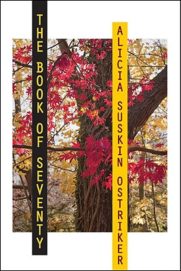 DG: Many seem to have forgotten over a century of struggle to get the right to vote, which was only achieved in my mother’s lifetime. I was born in 1941, only three years after women had the legal right to birth control. Margaret Sanger suffered jail and contracted tuberculosis in prison. She died struggling for women’s right to legal birth control. All of that seems to have been forgotten by many younger women. Some older women have said to me: Waiting for marriage to have a sex life isn’t necessary now, so many young women can’t find men to commit to marriage and children, ever since feminine sexuality was liberated. Sex used to be a bargaining chip for people to commit to marriage and raising children, but it’s no longer so.
DG: Many seem to have forgotten over a century of struggle to get the right to vote, which was only achieved in my mother’s lifetime. I was born in 1941, only three years after women had the legal right to birth control. Margaret Sanger suffered jail and contracted tuberculosis in prison. She died struggling for women’s right to legal birth control. All of that seems to have been forgotten by many younger women. Some older women have said to me: Waiting for marriage to have a sex life isn’t necessary now, so many young women can’t find men to commit to marriage and children, ever since feminine sexuality was liberated. Sex used to be a bargaining chip for people to commit to marriage and raising children, but it’s no longer so.
AO: True, and the birth rate is going down in developed countries among the educated who have access to birth control, sex education, and the right of choice. More women remain unmarried or if married, choose not to have children. The birth rate is going down in Japan, it’s going down in the developed countries of Europe, Italy, France, Scandinavia, and going up in underdeveloped countries where women are oppressed and there’s no birth control, education, or women’s right of choice.
DG: True, and Earth can’t sustain a population growing over 7.5 billion now, while climate crisis is now a dire emergency and food and water resources are dwindling? I was thrilled when you quoted a poem of mine in Stealing the Language: The Emergence of Women’s Poetry in America, 1986—among so very many other women poets who were liberated in their writings, erotically and sociopolitically then. But, now, I see all this crazy merchandising of wigs and outlandish hair color, elastic tight girdle-like body suits; wired push-up brassieres; hideously crippling high-heeled shoes; discomforts that feminists of the ’70s struggled to reform. There’s a breast augmentation, plastic surgery; lip, nose and tongue piercings for metal rings and studs, even nipple and navel rings! Crazier styles than ever, when we tried so hard to be natural with flowing hair, bra burning, giving up makeup, wearing cotton Indian clothes and African dashikis, going natural! And women think burkas are so terrible, while they put themselves through what might be considered worse.
AO: Yes, it is kind of absurd. I thought that one thing feminism had accomplished was that you don’t have to wear high heels anymore, and now we have all these crazy fashion practices that seem reactionary with a vengeance! I don’t know what to make of it, but it certainly is the case. There was a period when women wanted to look and be more natural and that era seems to be over, when most young women are now spending more money to make themselves into products!
DG: Yes, and so much of it seems ugly, purple and green and fuchsia hair and black and blue fingernails, toenails and tattoos and nose rings everywhere. It seems crazy to me.
AO: Well that’s a matter of taste. (Laughter)
DG: (Jokingly) But my taste is good taste!
AO: (Laughing) I can’t say I understand these phenomena any more than you do, but it’s partly I think, that one’s body is something one has control over and can adorn. I also think that most women dress and adorn themselves for other women and not for men.
DG: Maybe so. At the same time we have more women lawyers, doctors, scientists, professors, authors, and professionals of all kinds. While, more women are struggling to raise children by themselves, while attempting to be writers as they do so— with the greatest poverty among women raising children alone. That seems a paradox.
AO: Every society is built on contradictions, and the crackup of feminism is one of ours.
DG: Much poetry nowadays is abstract or solipsistic in the John Ashbery mode. My friends who were English majors in their college days, but not poets themselves, say that now they read The New Yorker, for example, and they’ve no idea what most of the poems are saying. Are such styles of writing driving readers away from the art? I don’t find this to be much so of your writing, or the generation of poets that came before the current crop. I’ve just read your latest books and I find them to be deeply enjoyable, in that one can identify with the ardor, the feelings that come through imaginative imagery in your poems. There’s poetic clarity in the language and metaphor, emotive and wise musings that are palpable. Which is what I think poetry should be in sharing human experience. Do you want to talk about the phenomenon of so much abstract or inaccessible poetry?
AO: I think what’s exciting about American poetry is that it’s all over the map. There are many styles and genres. There’s a good deal of poetry that I can’t read, and I’m not interested in reading, because it’s too abstract for my taste, although it’s considered important by others. I’m not an Ashbery fan, and I don’t mind being an outsider, swimming against the current of fashion. There’s also an immense amount of poetry of the kind that makes me want to read and reread, that’s intelligent and passionate, that’s written by the whole person and is accessible and imaginative. I could reel off dozens of names of poets I enjoy reading. There are styles of poetry that many young people love and I don’t. And there are styles of poetry that I love, that it seems some young people don’t.
DG: My husband used to say that only a fascistic culture loves poetry that makes no sociopolitical sense. I feel that though John Ashbery is a cultured, pleasant fellow, his winning every big prize has fostered a large number of young poets who think that writing poetry means you can’t make sense or have meanings that show emotional or psychological truths about what it is to be alive. Ashbery has beautiful imagery, but generally, his works are like a Jackson Pollack, action painting. He can be very clever, but one John Ashbery would have been enough! There seems to be much meaninglessness, abstract American poetry now!
AO: That is true. It’s true. But there are people who can’t read any poetry that’s not in meter or rhyme, and that means they can’t read my poetry, they can’t read Galway Kinnell’s or Allen Ginsberg’s. Many of the people that you and I love would not interest the people who feel poetry has to be written in meter and rhyme.
DG: Yes, but, I think that those people, if they read you or Galway Kinnell or Allen Ginsberg, Lucille Clifton, Grace Paley or Mary Oliver would get something from your poetry, but they would never get anything from the abstract or the language schools of poetry. Not that poetry can’t be experimental, like say e.e. cummings, and still have accessibility. I feel that the poetry that doesn’t touch the soul, the human spirit with shared experience and emotion, wise musings, and psychological depth drives people away from reading poetry.
AO: I feel the same way, and I think language poetry and the other poetry movements that avoid meaning come out of a real despair that is not acknowledged as despair. There’s a French writer, Bruno Latour, who said: “Post modernism is modernism without the hope. I think there is a lot of deep despair, not acknowledged as such, which exhibits itself as the art of meaninglessness.”
DG: Interesting! Psychologists would say it’s avoidance, because it’s too painful.
AO: Yes, avoidance of meaning and feeling because it’s too painful.
DG: I’ve talked about how much I enjoyed your book The Old Woman, the Tulip and the Dog. That book was so comforting to me. I could climb into it and live through the thoughts and feelings in the poems, and feel less lonely in the experience of aging. I found it enormously engaging in sharing with gutsy humor, earthy feelings and acceptance of the vicissitudes of living into older age, the understanding of the imperfections of the world we live in. I appreciated, just for one example of many:
The Wind that Blows Through Me
I feel the hand of God inside my hand
when I write said the old woman
it blows me away like a hat
I’ll swear God’s needy hand is inside every atom
waving at us hoping we’ll wave back
Sometimes I feel the presence
of the goddess inside me said the dark red tulip
and sometimes I see her
waltzing in the world around me
skirts flying through everything looks still
It doesn’t matter whether you call the thing
god or goddess, those are only words
said the dog panting after a run through the park
and a sprint after a squirrel
theology is bunk but the springtime wind is real
AO: The title of that poem, “The Wind that Blows Through Me,” is from a D.H. Lawrence poem about creating art that begins, “Not I, not I, but the wind that blows through me”—one of my favorite quotes about the creative process or, indeed, the process of living.
DG: Ah, yes, and I also love when you wrote: “We dogs wake and sleep / but we define our identity/ by what we choose to love.” So simple but so true and aptly said. I quoted your poem “Prayer” when I walked in your door on this windy day: “The wind whips round about without ceasing/ Now let the ecosystem’s brokenness/ be sung in arias/ every bar immortal melodious/ tragic cried the tulip. . . .” So apt for our time because we are trying to acknowledge the brokenness of eco-systems and realize the need for biological diversity in our age of climate crisis emergency and species extinction. Your poem continues: “Mother, show me where you are broken / open the door beyond which / is darkness/ see I am abject/ my chin on the ground / my tail quiet cried the dog.” That poem was so important to me. Do you want to say something about it?
AO: I didn’t even remember writing that poem, which means that was one of those pieces that wrote itself without my thinking, which means I presume, that it was waiting to be said, and just chose me to as the one to say it.
DG: The wind blew through you in the D.H. Lawrence sense? And I like when you wrote, “that we define our identity / by what we choose to love.” I don’t know if you can say more about these poems than you’ve already said in the poems?
AO: Well, there’s also the choice not to love, and I think, Daniela, when you are disturbed by women not getting married and having children, that they’re choosing not to love, and that’s a choice also, and when you’re disturbed by poets not allowing meaning into their poems, that’s a choice also. There’s that choice not to love, because love is too risky, too dangerous, no good can come from it, is what many people feel.
DG: Yes, but that scares me, because it seems to me that loving and sharing love is the greatest experience of life . . .
AO: But, also perhaps the greatest source of pain.
DG: The great sadness of my life is that I never had a child with a man with whom I was deeply in love, and he deeply in love with me, our bodies combined into a new being. I’ve a line in a poem, “A child born of love, heals the universe.” What a profound feeling to have a child born of profound love.
AO: That’s the romantic fantasy that many people reject, convinced that holding that ideal up to yourself only brings you grief, only brings you disappointment. Many feel: Don’t even try.
DG: Well, maybe you’re correct. I’ve one wonderful daughter whom I adore. How many children did you have?
AO: Three: Two daughters and a son.
DG: Wow, and you managed to do so much good work . . .
AO: But I never had that perfect, ideal communion with my husband that you are imagining and that is the romantic ideal, and has been the romantic ideal for women ever since marriage became about love, rather than something that has to do with economics. It’s been an ideal for many men and women, including me when I was younger, but it’s a ridiculous ideal, because it doesn’t happen.
DG: Maybe it’s ridiculous because it doesn’t happen, but don’t we need ideals to aspire to, just like we need, as women, a Goddess figure to aspire to even though perfection isn’t possible?
AO: Well, you’re saying “we.” And I partly agree with you, I partly have that young idealist still alive in me. But I just met a Black woman author who is writing a book about the use of pronouns, and what they really mean. Pronouns such as “we” and “they.” And questioning “we,” as a pronoun, and what does “we” mean? It means “me” or “I.”
DG: True. (Laughing) Yes. It often means “I”, but not always.
AO: (Laughing) Many people say, we must this and we must that, and we should this and we should that, and all it ever means is me. And people like me, and everyone should be like me.
DG: Often that’s true, but isn’t it bad to live in a me world of ego? We don’t want a world without sense of community, do we? So, sometimes we say “we” so we won’t be divided and conquered into warring factions due to racism and prejudices against the they.
AO: Well, but it’s a problem, because the we who have all these wonderful ideals reject people who don’t share our ideals.
DG: True, but the secret is not to reject the people who don’t share the exact same ideals, but then, it’s complicated, because don’t we have to draw a line against the murderers, war mongers, and racists . . .
AO: And where do we draw the line? It is complicated, and it makes me uneasy to say we this and we that and we need this and we should that . . . I try not to say we. I try to be guided by the wind that blows through me, and I try to avoid we and they . . .
DG: You’re so much better at accepting the vicissitudes of life. That’s what makes the old woman in The Old Woman, the Tulip and the Dog so appealing. I’m trying to get to that place, so I won’t spend so much time in activism for human rights and climate justice, and marching through the streets with my old knees. I’d like to get back to more writing, which is so much more pleasant to do.
AO: The work that you are doing is tremendously important and valuable. You must not quit being an activist. You are out there making the world a better place.
DG: You’re kind to say so, but that brings me to these verses from your poem, “April”:
The optimists among us
taking heart because it is spring
skip along
attending their meetings
signing their email petitions
marching with their satiric signs
singing their give peace a chance songs
posting their rainbow twitters and blogs
believing in a better world
for no good reason
I envy them
said the old woman
The seasons go round they
go round and around
said the tulip
swaying among her friends
in their brown bed in the sun
in the April breeze . . .
Here we are in April with the tulips popping up and that poem from your latest book fits our discussion so perfectly.
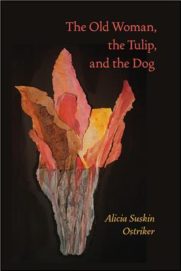 AO: Yes, it does. And the line for no good reason is a pivot line that applies to what comes before and what comes after. They do these things for no good reason, and I envy them for no good reason says the old woman.
AO: Yes, it does. And the line for no good reason is a pivot line that applies to what comes before and what comes after. They do these things for no good reason, and I envy them for no good reason says the old woman.
DG: I’d love to get to that calmer place. I’m so haunted by climate crisis emergency and the catastrophe closing in on my young grandchildren, and all children, that’s why I helped organize The Peoples Climate March in September, 2014. I don’t think most people are thinking of what climate crisis means: drought, thirst, hunger, starvation, wars over resources, migrating cultures clashing violently. It’s already happening now in the Mideast. The Syrian conflict started over a twelve-year drought in Syrian farmlands that drove the agrarian society into the cities. When Assad didn’t respond to their hunger, thirst, and need for work, a revolution broke out that became invaded by various factions, including the insanely fanatical Daesh, erroneously called the Islamic State. I fear all culture, art, and poetry is imminently threatened, so why keep writing?
AO: Well, I didn’t know that about the Syrian conflict. Urbanization, whether caused by drought or not, is a tremendously destabilizing phenomenon. People leave the land, go to the cities, can’t find work . . . yet I don’t believe in doomsday scenarios. I’m tempted to be a pessimist, but I believe there will be survivors after all our catastrophes and civilization of some sort will go on.
DG: Speaking of civilization, here is a poem from The Old Woman, the Tulip and the Dog titled “Ridiculous”:
This is ridiculous
said the literary old woman
nobody gives us any respect
the young in one another’s arms
are talking on their iPhones
the congressmen are lying through their teeth
and our husbands are watching the game . . .
(Laughter) I really identified with that, though my husband never actually watched “the game.”
AO: (Laughter) No, neither did mine.
DG: Older women don’t get respect, it seems. I notice when I’m walking down the sidewalk with my packages, the young women with their baby carriages don’t move over for me, but if an old man comes down the walk, they respectfully move aside.
AO: Well, I have a different experience. First of all, I intend that poem to be funny.
DG: Yes, it’s funny.
AO: And we like complaining, because nobody ever respects and appreciates us enough, but I get onto a subway and a young person jumps up and gives me a seat . . .
DG: Ah, yes, I find that, too.
AO: And I think that New Yorkers have become more polite, or could it possibly be that I’ve become older?
DG: (Laughing) Yes, I’m saying “Thanks,” but I’m thinking, “Do I look that old and helpless?”
AO: (Laughing) Here I am strong and capable wearing my enormous backpack and they get up and give me a seat.
DG: (Laughing) I carry a cane, so I don’t look as strong as you with your enormous backpack. But, thinking of you strong and able, I just love the way your latest book of poems ends:
Summertime
In the world of flies
time is a breeze they ride
right on by says the old woman
right on by over rivers and ponds
I imagine myself a raveled cloud
raining on rooftops
the embodiment of illusion
says the dark red tulip
Finally they have taken me
to the shore it is the happiest
day of my life says the wet dog
oh those seagulls
So, it ends on an affirmative note of accepting life for what it is. How did you come upon this conceit, this imaginative conversation between an old woman, a tulip, and a dog? It’s so perfectly used in this book.
AO: I came upon these three characters by accident. I’m an insomniac. So one night I got up and sat in front of my laptop, which is an extension of my body, my muse, my friend, my therapist. My computer knows me better than I know myself and I sit in front of it sometimes when I can’t sleep, and it writes a poem. It wrote: So, this was nothing I’d been thinking about but I, or it, wrote the first stanza of “The Blessing of the Old Woman, the Tulip, and the Dog.” Then I sat there, and my computer said, “That’s not enough for a whole poem.” Then I wrote the tulip. I thought, “There must be something else,” and then I wrote the dog. But really, that poem wrote itself as: The Blessing of the Old Woman, the Tulip, and the Dog:
To be blessed
said the old woman
is to live and work
so hard
God’s love
washes right through you
like milk through a cow
To be blessed
said the dark red tulip
is to knock their eyes out
with the slug of lust
implied by
your up-ended
skirt.
To be blessed
said the dog
is to have a pinch
of God
inside you
and all the other dogs
can smell it.
And then I looked at it and thought, “Well, this is really charming and amusing and like nothing I’ve ever written before. It’s light, but it’s also serious, and I’ll never write anything like that again.”
DG: The collection has all those different dimensions and qualities, and the metaphor gives the poet the chance to talk through three contrasting voices.
AO: And of course all those contrasting voices are me. But at that time, I was writing very different, denser, more serious, more political poems. A couple of years later, these three characters started turning up again, until it was clear they wanted to be a book. I didn’t invent them. They found me. They just kept marching out of the stratosphere, or wherever they came from, and announcing themselves, so that I began to recognize them when they appeared, and to have a sense of their personalities and the kinds of things they might say, but I was always trying to listen to what they were trying to say, rather than planning it.
DG: Yes, and they have different personalities.
AO: Yes, they have very different personalities, and arriving at what their personalities are enabled the poems to be written. But, I never knew what they were going to say next.
DG: It’s a wonderful conceit, and it works beautifully.
AO: Part of what I think is interesting about it, is pointed out by friends who said, “Do you notice that there’s no dualism in these poems?” There are three voices in these poems. So, there’s an example of there is no us and them! No we and they.
DG: Ah yes, there’s no judgmental attitudes between them. They seem to just live and let live. To each his own!
AO: Though, I’ve written many poems and books in which there is an us and a them—but not this last book. This book is three independent voices with their own points of view and they belong to the world of the human, the vegetable and the animal. I wasn’t even thinking that when I was writing them. When people asked what do they represent, my first answer was always, “They represent themselves!” But, you could also say they represent the ego, the superego and the libido. You could say they represent lots of things.
DG: I see that, too. And, they each have their different ways of accepting or living or evaluating their lives. The dog is simple, here now. I run, I lick, I enjoy, I wag my tail or let it drop disappointedly. I lay my paw in your lap for love. That dog has the joie de vivre of dogs in that well-known poem of yours, “The Dogs at Live Oak Beach.” The old woman is more resigned, having to accept aging and the vicissitudes of life, and the tulip is concerned with its own beauty and the transiency of life. . .
AO: The tulip is a narcissist!
DG: Like women who care too much about looks and clothes!
AO: Exactly. And being admired.
DG: I just love the whole conceit and the way you put the book together with its wisdom and humor, philosophical and psychological musings. I’ve truly had such pleasure in reading it.
AO: Well, thank you.
DG: I wonder what you are working on now, prose or poetry or literary analysis. I’ve also greatly enjoyed reading Feminist Revision and the Bible as auxiliary to participating in your Midrash poetry workshops that I find enlightening and stimulating. You seem to have a genius for observing psychological elements in literature. I wonder if you have another analytical book in the works. Though I know you don’t care so much for literary theory per se, or analyzing such terms as post modernism and such. You prefer using imaginative metaphor in writing about literature. Could you expound on that somewhat?
AO: I have a book of poems that will be coming out about a year from now. Once again it’s different than anything I’ve done before, because I get very bored and don’t like doing the same book over and over.
DG: Yes, all your books are different in style and content. I think of what Picasso said when someone complained to him, “Why do you have so many differing styles, why don’t you settle on a style?” And he answered, “Does God have a style?” You’d never say anything so lacking in humility, but you’re very varied in the styles of your books. I think that is a good thing. It demonstrates differing kinds of originalities and abilities at handling work.
AO: Well, the new book is partly a collection of poems about New York City, now that I’m in the process of becoming a permanent New York citizen. And it’s got political poems and that’s something that I’ve always done. It’s got a whole set of odd poems that are experimenting with form, and some are just playful. So, it’s different than anything I’ve done before. It’s less unified. Trying to arrange it was hellish, but I think I’ve got it in good shape now. Part of what was interesting for me in writing it was working with the city and specifically the neighborhood that I’m living in now, the Upper West Side of Manhattan, where many people on the street are speaking Spanish. It’s interesting for me to be in a situation where I’m in the minority. I so much wanted to come back and live in New York City, because that’s where I grew up.
DG: You grew up in Brooklyn?
AO: I was born in Brooklyn, but I grew up in Manhattan. Manhattan always represented energy, liveliness, artistic activities—all the things that everyone always says about Manhattan, but what’s interesting to me now, is looking at the generation of immigrants who are now Spanish speaking. My immigrant grandparents came over in the 1890s and I’m watching a generation of people whose language I don’t understand, and I’m feeling that the city no longer belongs to me, but to them. And a lot of the poetry I’m writing has to do with looking at what The City is becoming right at this moment. So, that’s what I’m doing, and that brings me to want to write an essay on the poetry of the city. I’ll be giving a lecture later this month at Drew University on this topic. I’m not sure but I think I want to write a full-scale article about it. There doesn’t seem to be much of a poetry of the city until Baudelaire and Whitman.
DG: I reviewed an anthology titled Poems of New York, 2002, that was featured in a group reading at The Great Hall, Cooper Union. The book was inspired as an antidote to the 9/11/2001 attacks. Maybe you’ll want to take a look at that book.
AO: Oh, yes, I would.
DG: The Nakedness of the Fathers is a book in a hybrid form that you’ve invented: re-imagining Old Testament stories that you intersperse with memories, vignettes of your own life as a Jewish woman of a very special kind. Reading your reaction to the Biblical characters in The Book of Esther, I realized you were raised, as a small child, on your grandfather’s lap as a socialist atheist, who as a small child realized she was both culturally Jewish at home and American at school. So, I wonder why you took to studying The Torah and teaching the Midrash poetry workshops. What prompted that?
AO: I was raised third generation, Atheist Socialist Jew. There was no religion in my family whatsoever, except Atheism, which in its way is a religion in itself, as you know.
DG: Yes, I was raised that way.
AO: So my religion consisted of my being told that religion is “the opiate of the masses.”
DG: (Laughing) I’ve heard that often, too.
AO: My family didn’t celebrate any of the Jewish holidays. I knew nothing about them. I knew nothing about being Kosher. The first seder I went to, I had no idea what was going on, but I was always drawn to things of the spirit. Later on, I had experiences that need to be called spiritual experiences. One summer I read William James’s Varieties of Religious Experience, sitting up in the Cloisters, and thinking, “Yes, yes, yes!” And when he says someone who has had religious experiences cannot be talked out of them, because for them they are capital R, Real, that described me. William Blake was correct. Walt Whitman was correct and writers like John Dunne and Gerard Manley Hopkins seem right, except I didn’t accept their Christianity, but I accepted it in the sense of knowing, feeling, not believing, but experiencing the world as holy, as when Blake says: “Everything that lives is holy.” That was something I had experienced. When Whitman says the same, that was something I’d felt. There was nothing in my childhood, or in my education that gave me that. It was given to me by experience. Of course, we were all exposed to Christianity in American culture, but when I was in college, my boyfriend, subsequently my husband, gave me a copy of The Bible to read, which he’d picked up from an ashcan and said, “I think you should read this.” (Laughing)
DG: (Laughing) Oh, I love this story.
AO: So, I spent a summer reading The Bible—by which I mean what is called The Old Testament, the Jewish Bible—and I bonded with it. Immediately, I experienced it as mine. This is mine. This is my stuff. I loved John Donne. I loved Gerard Manley Hopkins, and I certainly had loved Blake and loved Whitman, but The Bible was mine—as if it was a set of dreams that I’d had myself, but didn’t remember. These men and women of The Torah were my mothers and fathers. This God was my God whether I like him or not. And what about the values? Some of the values in The Bible are my values, and some of them are the values I’ve struggled against all my life. They’re all there! (Laughter.) I didn’t do much writing with that bonding or that knowledge. I had that “Oh, this is mine” feeling, but in 1960, I was doing a good deal of graphic art and I did an etching of Jacob struggling with the Angel, with the title: “I will not let thee go, except thou bless me.” Which is what Jacob says to the mysterious angel, and in my etching, Jacob is struggling and frowning, and the Angel is smiling, just waiting to be asked for the blessing he plans to give. I didn’t do more with this until decades later, but in the end, what really defined my relationship to The Bible, and to Jewish tradition, is wrestling, trying to wrestle a blessing out of this patriarchal scripture, and this patriarchal tradition—to wrestle a blessing out of it. It wants to be wrestled with. That’s my view.
DG: Yes, as in your book Feminist Revision and the Bible, where you’re wrestling with it, and finding stories in it that interest you to analyze their meaning, agreeing with bits of wisdom you find in it and explicating stories and characters at times and disagreeing or revising it at other times. The Nakedness of the Fathers, in a way is also wrestling with The Torah.
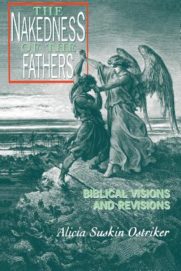 AO: Definitely wrestling. I can pinpoint how The Nakedness of the Fathers started: I had just finished Stealing the Language, and it was in press, and I was home one night, a dark and rainy night, and for some reason that was not clear to me I was thinking about The Book of Job, and the double ending of The Book of Job, where first the voice out of the whirlwind is telling Job to shut up, and then the ending where the book goes back to the prose frame, where Job gets his health and his wealth back. This is supposed to be a happy ending. He also gets ten new children to replace the ten that God lets Satan kill at the beginning of The Book of Job, and suddenly the thought came to me, “What did Mrs. Job feel about that?” And that was the seed from which all the work that I’ve done as a Jewish writer, from that moment on, has sprung!
AO: Definitely wrestling. I can pinpoint how The Nakedness of the Fathers started: I had just finished Stealing the Language, and it was in press, and I was home one night, a dark and rainy night, and for some reason that was not clear to me I was thinking about The Book of Job, and the double ending of The Book of Job, where first the voice out of the whirlwind is telling Job to shut up, and then the ending where the book goes back to the prose frame, where Job gets his health and his wealth back. This is supposed to be a happy ending. He also gets ten new children to replace the ten that God lets Satan kill at the beginning of The Book of Job, and suddenly the thought came to me, “What did Mrs. Job feel about that?” And that was the seed from which all the work that I’ve done as a Jewish writer, from that moment on, has sprung!
DG: Interesting! I love the story about your husband finding the first copy of The Bible you ever read in a trashcan during your college years, when you were dating, and his telling you, “Here’s something you should read.”
AO: He loves telling that story! (Laughter)
DG: And, he’s an astrophysicist. I wonder if being married to a scientist was something of an influence on you? My father was a scientific atheist, a chemist, and I was married to a Ph.D. scientist, whose brother was a noted physicist. That influenced my view of the world. I wonder if living with a scientist has influenced your writing, and if your husband was raised with more religion than you were?
AO: Jerry was raised as a normal sort of twice-a-year, synagogue-attending, Jew. He had a Bar Mitzvah, but it didn’t mean much to him and it doesn’t now mean very much to him, but it means something. The socialism and communism of my parents came out of their being Jewish, but they didn’t know it. That is to say, they were in the tradition of the prophets, but they didn’t know it. I was able to make that connection later, after I read the prophets— that the passion for social justice that my parents had was born in the writings of Isaiah and Ezekiel. They didn’t know it, but I came to know it. As for living with a scientist: Science has gotten into my poetry a little bit, not much, but rationality—caring about meaning, caring about logic—is very important to me, and I think all my prose, all my critical writing, is supported by being married to somebody who is a scientist and cares about logic. We used to talk about what we had in common as scientist and poet: Both of us are workaholics. Both of us make the assumption that we are searching for truth, and that the surface of things is not the whole truth. Both of us are willing to work and work and work on something until we think we’ve got it right. And, both of us understand that we don’t know where the ideas come from. That’s a mystery!
DG: Yes, consciousness is not something understood by neurological biology. We don’t know where consciousness or ideas come from. I’ve read scientists’ studies of the brain that state it’s not understood from where or what exactly consciousness comes.
AO: And, yes, we don’t know exactly where ideas come from. We know that ideas bubble forth from some kind of interaction in the mind, or outside the mind, but we don’t know. We just don’t know. Both my husband and I accept that ideas come from somewhere over which we have no control, but can invite.
DG: Exactly, very well put. Also, Jeremiah Ostriker has written about the expanding universe of dark matter, or dark energy, and how we don’t understand all of what’s out there beyond our solar system where billions and billions of supernovas are exploding and stars upon stars and solar systems upon solar systems go on and on expanding. Universes beyond us!
AO: He doesn’t do the “Oh, Golly Wally, Gosh thing!” He’s not into wonder. He’s into analysis.
DG: And you’re into wonder as a poet?
AO: I’m partly into wonder as a poet. And I’m partly into analysis.
DG: Yes, you’re very good at literary analysis and analyzing psychological elements in literary art. As a poet I can’t just enjoy writing as much as I’d like to. I’m driven toward activism—so much so that I can’t seem to write anything but ecological poetry. How do you avoid letting thoughts of climate catastrophe narrow your writing in your later years?
AO: Somehow, maybe irrationally, I think that terrible things have always happened, and maybe somehow some civilization on the Earth will survive, or, maybe not! And when I think about the future, that maybe we will destroy ourselves and the cockroaches or rats or microbes will take over the Earth; what makes me feel truly sad is that after the apocalypse there will be nobody around to appreciate Shakespeare or Mozart or Rembrandt.
DG: Exactly! Let alone my own humble art. So how do you manage to stay at the top of your form, still writing onward?
AO: Doom may happen, or, another version of the future is that we are working to replace ourselves with electronic beings. We seem more and more determined to stop being organic.
DG: There does seem to be this worry among some scientists that we could create robots that will control us, which we will not be able to control. And it’s happening somewhat already.
AO: It’s been happening. That’s another version of the future. And still another version of the future is that we will keep muddling along, in a world where we have horrible, horrible cruelty and war, alongside amazing kindness and creativity and love. The world has always been that way, and maybe will continue to be that way—muddling along and with an array of terrible and wonderful things. I think I get this from Walt Whitman who just records and accepts, and who understands that there are horrors and beauty and that’s all part of the phenomenon. One of the things I think about, when I think about “God,” is that for “God” it’s all a spectacle. We can have the God’s eye view, a little bit, when we recognize that we enjoy drama, that we enjoy tragedy! People like to watch violence. They may not like violence in their lives. But, people like to watch violence, and it may be that God likes to watch the violence on the planet—that to God it’s a show. It’s all a show! The love, the joy, the creativity and Bach and Mozart, along with the cruelty and violence—it’s all a show! And God likes to watch it.
DG: And the mask of comedy and tragedy are equally entertaining and powerful in the drama and the spectacle of it all? I hope I can arrive at that acceptance.
AO: I have never seen God as Love the way many preach. I don’t understand what people can possibly be thinking when they think that God is Love. There’s no sign of that at all. There’s no evidence at all that God is Love, but there is evidence that “God” or whatever name you want to call it, can be identified as Creator. We have creation and we have the incredible complexity and beauty of creation, and also its horribleness: that everything lives by killing and eating something else.
DG: Yes, what we call the “vulturism of the sea” and on the land and in the air.
AO: And everything alive lives by devouring other living things. It’s beautiful and it’s terrible, and that’s what Creation is. That’s what it’s about, if we want to speculate about what God is—God is the force through which all comes into being.
DG: And to think about relativity, we wouldn’t even know happiness if we didn’t know sorrow, because there is no perception without contrast. Contrast creates perception. We wouldn’t know beauty if we didn’t know ugliness. We couldn’t experience love if we didn’t know hate, and so experience happens in a universe of relativity.
AO: I think that I can accept the way things are, because Whitman is so important to me as a teacher; that’s what makes me able to accept all the things you say you have difficulty accepting.
DG: Yes, even though I realize that contrast creates perception, and I cried at age 17 when I first read Whitman’s Song of Myself, I still have difficulty accepting the ugliness, cruelty, and hatred. You’ve given many interviews, but what question, or questions, that you’ve never been asked in an interview do you wish you’d been asked?
AO: That’s always a good question. I don’t know. I have to think about it. You could ask me, “What are you afraid of writing?” I always tell my students to write what they are afraid of writing. But, I don’t know what it is I’m afraid of writing, so I can’t quite answer that question yet.
DG: Well, that’s a good answer. Are you glad you chose a life in poetry? I asked that question of Galway Kinnell, and he said that sometimes he wishes he’d chosen something more practical that could make a greater difference in healing the world, like being a doctor or saving animals or the rain forests, something like Daniel Berrigan, Martin Luther King, Jr., Jonas Salk, or Rachel Carson—but that ultimately he had no great regrets at being a poet. I feel it’s a rich life to live amidst the minds and thoughts and imagination of poets, but sometimes I wish I’d chosen something more hands on healing like social work. I’ve tried to fuse my environmental consciousness with my poetry by, for example, right how editing www.Eco-Poetry.org online. Grace Paley, who was a beloved activist as well as a writer, told me in an interview that her life in anti-war activism and social justice had been difficult to fuse with her life in writing and poetry. She felt her activism and her writing rarely came strongly together.
AO: That’s not true. When she said that, she didn’t really understand the impact of her writing as activism.
DG: But can you talk about what you feel on that subject?
AO: I feel the same kind of feeling. I feel guilty that I didn’t have much choice in the matter, because poetry and writing is the only thing I really know how to do, and I wish I’d been able to be more of an activist and act on my convictions more than I have. So, I feel that regret, and I’m glad that my husband has done things that are more useful in the world, that I haven’t done. The thing I’ve done that’s useful I feel is my teaching.
DG: And your encouragement of women with your writings, and your encouragement and inspiration of your students with your books. But, has your teaching, which I’ve seen you are very good at, impinged on your writing? I notice that you don’t write in your own workshops to the prompts that you give, and you say you can’t. So I’m curious what you feel about the influence of your teaching on your writing.
AO: I don’t know if my teaching has an influence on my writing. My critical writing and my poetry interact. My critical writing is what I think my knowledge and understanding of poetry can give to others, and my teaching can enrich the lives of my students. I can give them more understanding of life and reality and themselves through the discussion and analysis of literature, more understanding of society and history by my teaching, and I can help them have a richer life. In that way I feel I’m useful. And, what it does for me, is keep me in touch with other people who are not me. Especially when I was feeling so much more in touch with younger people than I do now, since partially retiring from teaching. It kept me up!
DG: I know you started out as a William Blake scholar and then you discovered yourself as an American poet by reading Walt Whitman, William Carlos Williams, Allen Ginsberg . . . and then, of course, you immersed yourself in many inspiring women poets when you wrote Writing Like a Woman and Stealing the Language. I wonder what women poets, in particular, had the strongest influence on your writing?
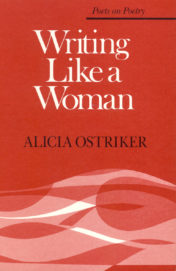 AO: That hasn’t changed much since I wrote Writing Like a Woman and Stealing the Language. All the women poets I was reading then inspired me, but the ones who have had the most influence on my style are probably H.D. and Lucille Clifton. And they are still important to me, but I’ve been influenced by hundreds of women writers, both in a formal sense, how I use language and the shape of a poem, and also in what I have the courage to say.
AO: That hasn’t changed much since I wrote Writing Like a Woman and Stealing the Language. All the women poets I was reading then inspired me, but the ones who have had the most influence on my style are probably H.D. and Lucille Clifton. And they are still important to me, but I’ve been influenced by hundreds of women writers, both in a formal sense, how I use language and the shape of a poem, and also in what I have the courage to say.
DG: Yes, but when I “Googled” you (as all researchers now do) this description came up first: “Alicia Ostriker is an American poet who writes Jewish women’s poetry. She has been called America’s most fiercely honest poet by Progressive magazine.” I see clearly the fierce honesty in your writing, and I see humor and wisdom, too, but I think of you as much more universal a poet than one who writes Jewish feminist poetry only. What would you say about that?
AO: Well, it’s true I’ve written whole books that are obsessed with Jewishness. But it’s a pigeonhole, because I’ve written a lot about other things, like art, for example, yet nobody ever talks about how I’ve written about Matisse, Van Gogh, Rembrandt, and other artists.
DG: Well, I’m glad I got you to talk about it now, since your poetry is often very visual in metaphor. You’ve created some visual art yourself, yes?
AO: Yes, when I was young I wanted to be a visual artist. That was my first love.
DG: I know you don’t believe in a punitive God, who looms large in Christian and Islamic traditions, and you’ve also said you’ve felt inspiration flowing from “God” or from some sort of parallel universe when you were writing your 2002 book of poems titled The Volcano Sequence—and you started writing that book after a hiatus of about three years of writer’s block. It’s difficult to imagine you with writer’s block, because you’ve been so productive and prolific, not to mention being the mother of three children and a professor of writing and literature. Do you understand what might have caused that writer’s block, and what relieved it? You say something about it in the poems themselves, but can you talk about it a little?
 AO: Yes, it’s all explicit in The Volcano Sequence. I couldn’t write poetry for three years. I could write essays, reviews, things that were cerebral, from the neck up—but I was out of touch with my soul. It seems for three years I had no access to my soul. One of my theories about writer’s block is that it happens when there’s something that you don’t want to look at, something under the rock. You don’t want to see something deep in you, so you’re not writing. What broke the block was looking at this photograph of a Greek volcanic island called Thera. I can’t remember its other name . . .
AO: Yes, it’s all explicit in The Volcano Sequence. I couldn’t write poetry for three years. I could write essays, reviews, things that were cerebral, from the neck up—but I was out of touch with my soul. It seems for three years I had no access to my soul. One of my theories about writer’s block is that it happens when there’s something that you don’t want to look at, something under the rock. You don’t want to see something deep in you, so you’re not writing. What broke the block was looking at this photograph of a Greek volcanic island called Thera. I can’t remember its other name . . .
DG: Is it Santorini, during the Roman era, or Thera in the Minoan times of Crete?
AO: Yes, and there’s archeological speculation that the eruption of the volcanic island caused the tsunami that drowned Atlantis, which is the Greek mythological equivalent of Eden, the happy and innocent place where everything was lovely and everyone was good. So, I was looking at this book of photographs of Santorini, once Thera, and thinking we might travel to this beautiful island of white rock in the Mediterranean Sea. Then the rock spoke words that were both its and mine. It was about anger and destructive violence, and I had to recognize myself as one whose anger had been destructive and in a metaphorical sense had made me an extinct volcano. And that broke the silence and I was then able to see things about myself that I didn’t want to see. So I made a conscious deal with the poems: “If you agree to keep arriving, I agree not to tell you what to say!” That’s how the book The Volcano Sequence was born. I was channeling those poems using a voice speaking to a “you” who is sometimes God and sometimes my mother, and there’s a lot of anger that gets worked through to some degree in the book.
DG: Your mother was a great inspiration to you. Didn’t she read with you a good deal of fine literature when you were young?
AO: Yup, she did, and she was an inspiration, but I was also very angry with her.
DG: I was very angry with my mother, too. Poor mothers. They have to take a measure of blame.
AO: Yes, and I’m sure my daughters are very angry with me.
DG: Perhaps all daughters are angry with their mothers at some point in their lives. There’s always the need to break free and become your own person.
Finally, you’ve talked about writing as a spiritual experience for you, and yet you’re an atheist or were raised as one, as we’ve said earlier. Can you talk about how writing is a spiritual experience for you? Despite your having no exact belief in God, you’ve studied The Bible more closely than most people ever do.
AO: What I said about my husband and I not knowing where the ideas come from? I can’t talk about this with any degree of clarity, but the ideas come from “the other side,” whatever that may mean to you or to anybody, that’s the metaphor that I have for it—the idea that creativity comes from beyond me, from a realm of the spirit that’s not the realm of the material world, which is not the material world, but comes through the material world and my experience of the material world. So, writing poetry is a spiritual experience, because it originates in “the world of the spirit.”
DG: A world that cannot exactly be defined the way the source of consciousness is not exactly understood?
AO: Yes, and that’s about all I can say about it, which isn’t much.
DG: That’s plenty. That says it all. I happened recently upon a curious poem of yours that I haven’t see in any books. It was titled “Untitled”:
A student invited me to be her midwife
It seemed an easy birth, the girl healthy and strong
I reached in, drew out the head
Pulled gently
But the head was smooth and cleft
Strange I thought but it will be ok
Only as I pulled and it emerged
It actually was a penis
Smooth and veined
pushing through the girl’s stretched labia
strange the dream arrived
So late so far along
in my life
You’re adept at psychological analysis of poetry and literary art. I know what I feel the poem is about, but what would you say about it?
AO: That was a dream, and I’ve written a large number of dream poems, but I’ve never put them in a book, because I don’t know what to do with them.
DG: Wouldn’t they make a good collection? And what would you say about the psychological dimension of this particular dream poem? I ask because I had a similar image in a poem of mine titled “The Sea Hag in the Cave of Sleep,” in which a woman gives birth to a baby that feels like a penis emerging from her vagina. It ends “I’m no spider queen after all, but a green beast with arms of sorrow. My whole body is a phallus, I come out from between my own legs into this world.” I’ve always thought how different it is for us in that men come from women, but we’re women born of women.
AO: Wow, you had almost the same dream I did. Adrienne Rich has a poem about women learning the trade of midwifery, in order to give birth to ourselves. My dream poem is a fantasy of androgyny.
DG: But doesn’t it also have to do with midwifery birthing power? As Freud said, in a man’s world, the penis equals power, and so you’re helping, as a teacher, your female student birth her own power in a male dominated world, or perhaps even helping to give birth to your own power.
AO: That’s obvious, too, and to be androgynous is to have the power of both female and male, and what made me laugh about that poem, is that I didn’t have that dream when I was thirty years old! (Laughing) Why did I have to wait until old age to have a dream like that?
DG: (Laughing) But, you do have the power of your whole career and all the good books you’ve written behind you now, and more ahead. So I see it as a realization of the birth of your power that’s been released into the world, and your helping other women to find their power. That’s why I wanted to culminate with that poem. It also shows your fierce honesty. I think you might well have a book of dreams at hand.
AO: Well, maybe at some point, I’ll comb through all my discarded poems and find the dream poems and make a collection of them.
DG: That could be a good project! I hope I’ve helped to inspire it. Thank you so very much, Alicia. It’s been interesting and enlightening. I’ve greatly enjoyed our conversation.
AO: Well, me too. Thank you, Daniela.
Click here to purchase The Old Woman, The Tulip and the Dog at your local independent bookstore

Click here to purchase The Volcano Sequence at your local independent bookstore

Click here to purchase The Nakedness of the Fathers at your local independent bookstore

Click here to purchase Writing Like a Woman at your local independent bookstore

Click here to purchase The Book of Seventy at your local independent bookstore

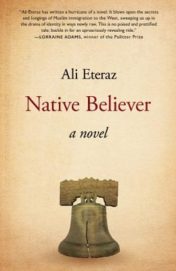 Ali Eteraz
Ali Eteraz
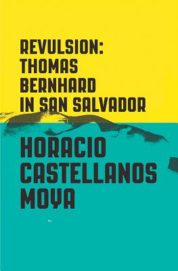
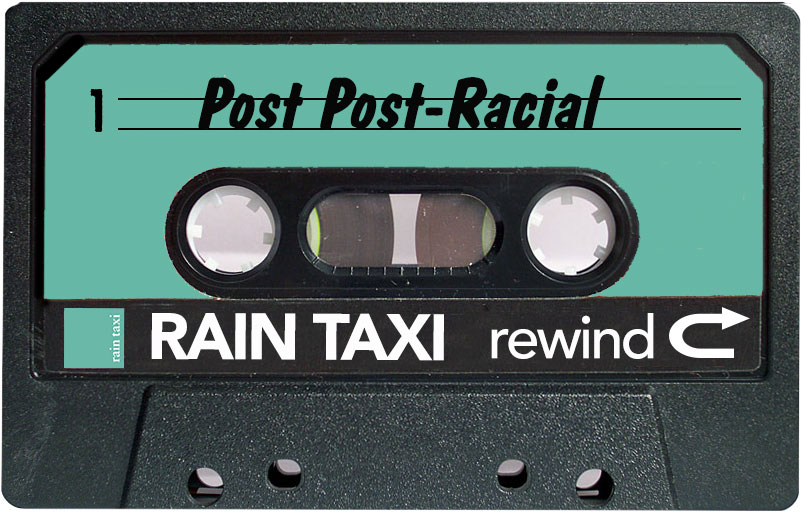 It was an incorrect idea when first posited and looks absurd in this moment, given the events of this year: we were never living in a post-racial America. The entire concept was meant as misdirection, put forth by those in this country who would choose to halt progress by announcing that there was no more inequity to address. “We’ve conceded enough privilege,” was the actual message lying beneath “post-racial,” and as we’ve seen in this election, that message has morphed from subtext to a full-throated proclamation.
It was an incorrect idea when first posited and looks absurd in this moment, given the events of this year: we were never living in a post-racial America. The entire concept was meant as misdirection, put forth by those in this country who would choose to halt progress by announcing that there was no more inequity to address. “We’ve conceded enough privilege,” was the actual message lying beneath “post-racial,” and as we’ve seen in this election, that message has morphed from subtext to a full-throated proclamation. by Daniela Gioseffi
by Daniela Gioseffi A teacher of literature and creative writing for many years at Rutgers University, Ostriker is much loved by her many students for her knowledgeable and clear style of teaching, and her accessible but highly imaginative poetry. She’s published over fifteen books of poetry and several scholarly works, including Stealing the Language: The Emergence of Women’s Poetry in America (Beacon Press, 1986) and Dancing at the Devil’s Party: Essays on Poetry, Politics and the Erotic (University of Michigan Press, 2000). She’s won several prestigious awards for her work, among them the William Carlos Williams Award from The Poetry Society of America, the San Francisco State Poetry Center Award, and the National Jewish Book Award; she’s twice been a finalist for the National Book Award.
A teacher of literature and creative writing for many years at Rutgers University, Ostriker is much loved by her many students for her knowledgeable and clear style of teaching, and her accessible but highly imaginative poetry. She’s published over fifteen books of poetry and several scholarly works, including Stealing the Language: The Emergence of Women’s Poetry in America (Beacon Press, 1986) and Dancing at the Devil’s Party: Essays on Poetry, Politics and the Erotic (University of Michigan Press, 2000). She’s won several prestigious awards for her work, among them the William Carlos Williams Award from The Poetry Society of America, the San Francisco State Poetry Center Award, and the National Jewish Book Award; she’s twice been a finalist for the National Book Award.




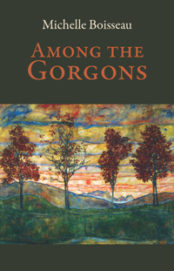
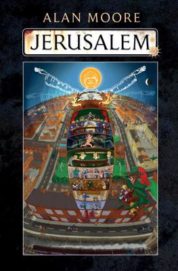
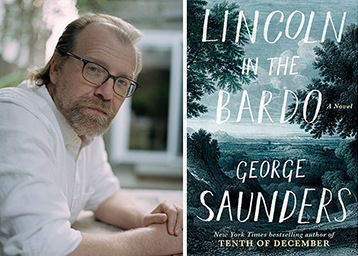
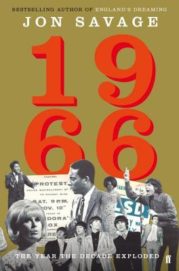
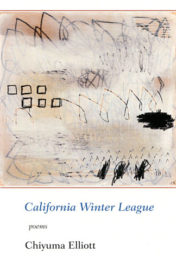 Chiyuma Elliott
Chiyuma Elliott